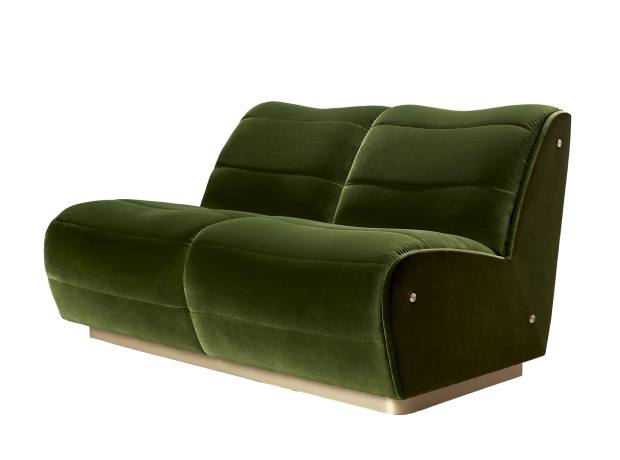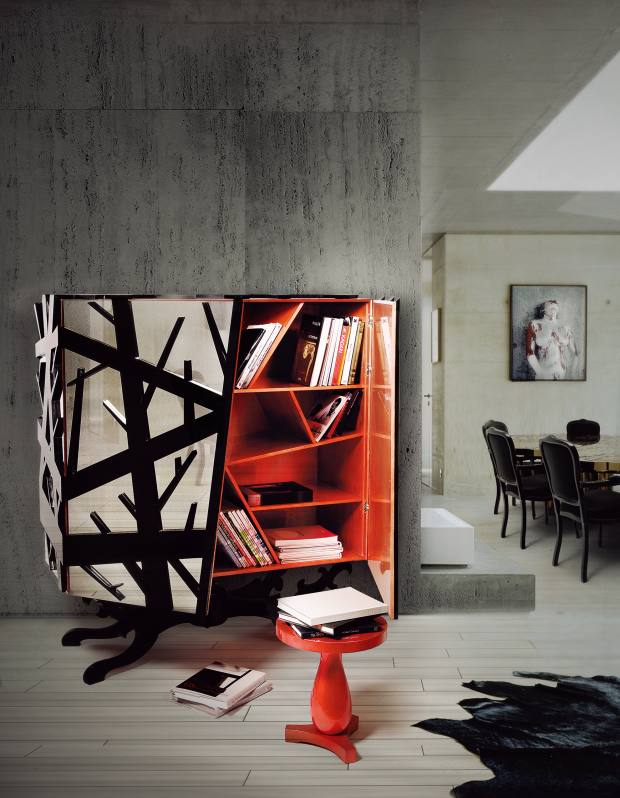Contemporary Portuguese brands are fast becoming design-aware homeowners’ new best friends. At any international interiors show, such as Milan’s Salone del Mobile or Maison & Objet in Paris, you’ll see heads literally turn as visitors spot the eye-catchers currently popping up from Portugal. And, as in any blossoming relationship, charisma and charm are essential ingredients. These designs are playful yet sophisticated, combining traditional artisanal skills with luxurious materials and a forward-thinking aesthetic.

“Young Portuguese brands take traditional techniques and add a unique spin, which makes them relevant for today,” says Annalise Fard, director of home at Harrods, an early stockist of contemporary Portuguese designs. Natalia Miyar, who launched her London interiors atelier in June after five years at the helm of Helen Green Design, is also a fan. “The innovation coming out of Portugal at the moment is pretty impressive,” she says, while London-based interior designer Fiona Barratt-Campbell adds: “The designs are considered and the quality is excellent. I love the materiality of pieces by companies such as Ginger & Jagger, Munna, Brabbu and Blackcork.”
Porto – Portugal’s second largest city – is home to many young brands. The current flowering of talent owes much to improved design education. A product design course introduced in 1989 at the ESAD College of Art and Design generated a wave of exciting new designers. Now more than 30 colleges countrywide teach design. The backdrop to this development is a lengthy tradition of bespoke, handcrafted work emanating from small family-run ateliers. What’s different now is an increasing awareness of contemporary tastes as long-established workshops adapt to recent economic challenges by seeking greater exposure to international markets.

Luis De Oliveira, the Porto-born co-founder of De La Espada who works with top international designers, including Autoban, Luca Nichetto, Matthew Hilton, Neri&Hu and StudioIlse, producing highly crafted solid-wood pieces at his own facility in Portugal, goes even further: “I have no doubt that the industry can become the second most important in Europe after Italy if our architects turn their attention to product design.”

“Portuguese workshops are very open to new ideas and happy to innovate and experiment; they offer high quality craftsmanship and are not afraid of mixing materials,” says Hassan Abdullah of interior designers Les Trois Garçons. Its own-brand furniture (£1,224) is made to order at a third-generation atelier near Porto, where “adjacent woodworking, metal and upholstery workshops make production easier and delivery quicker”. Indeed, most of the furniture in its recent refurbishment of a five-bedroom London house for a high-flying lawyer and her accountant husband was made bespoke in Portugal.

Artisanal techniques such as brass casting, hand-sculpted marble and marquetry (in wood or marble) are the specialist skills that give Porto-based Ginger & Jagger’s handcrafted furniture its luxurious edge. Its designs are inspired by nature both poetically and physically. Fig tree branches, rose bush briars, magnolia leaves and vines from the Douro Valley (home to port wine production) are cut then cast and hand-welded in brass to convey a remarkable narrative with deep emotional appeal.

A brass casting from magnolia branches unites a Carrara marble top and base in the Primitive console (€10,300). The Fig Tree console (€5,620) has legs formed from cast-brass fig branches, while rose bush briars, moulded and cast in brass, support the glass-topped Rosebush dining table (€7,520). Similarly, cast-brass leaves frame the Leaf pendant light (€8,980). And even where designs are not physically reworked from nature, its inspiration prevails. Pineapples appear as geometric patterns in the Ananaz side table (€3,780), while a layered leaf shape characterises the brass/nickel Bloom wall lamp (€1,280).

“Ginger & Jagger is a wonderful brand that pays tribute to Portugal’s crafts tradition but is very forward-looking,” says Miyar. “The Rock table [from €4,800], for example, has a lightness – a touch of whimsy – that’s quite unexpected from marble. Its designs are playful but sophisticated and sit easily with Biedermeier or midcentury pieces. Many are inspired by nature and clients respond intuitively to their organic forms. I sometimes use this narrative as a departure point for my schemes, while the complementary but contrasting materials, such as wood with metal, help glue an interior together.”

Rio Tinto-based design group Menina has injected considerable verve into a previously conservative, rather parochial industry. Keen to court a global audience, Menina co-founders Amandio Pereira and Ricardo Magalhães have created several brands, each with a distinct identity, marrying traditional Portuguese crafts and artisanal techniques with a contemporary design aesthetic. Among these are lighting specialist Delightfull and furniture brands Boca do Lobo and Brabbu. Nature is a big inspiration for Brabbu’s designers. The Soleil pendant light (€3,040) is a hammered-brass sunburst, while the Kaamos mirror (€3,020) – inspired by the sun sinking below the horizon at the Arctic Circle – has a circular frame in which chunks of walnut veneer intersect with brass and copper leaf to create interesting reflections. The Sequoia side table (from €6,770) resembles a raw tree stump refined by a walnut top and aged-brass base, while the Apis dining table (€27,530) has a brass base that echoes the interior of a beehive.

“Brabbu’s pieces can make a real statement in a room,” says London and Doha-based interior designer Katharine Pooley. Production processes are as important as materials in this respect. The warm hues of the Canyon folding screen (€14,010) are created by applying red, brown and aged patinas to its brass surface. And the Andes armchair (€2,280) and sofa (€3,680) owe their generous proportions to a shell-like shape meticulously upholstered in velvet.

Equally opulent are the upholstered designs by Munna, a sister brand to Ginger & Jagger. With a mission to “transform emotions into products”, the company gives classic styles a contemporary twist. Be Mine (€3,100), an oversized, buttoned love seat, and the Soft & Creamy high-back wing chair (€2,340) are reminiscent of Victorian boudoirs, while the curvaceous Ferdinand (€13,200) and Newman sofas (from €4,060) and asymmetric Empire screen (€6,700) successfully update traditional concepts.

Historical references are also contemporised by Frato, a Porto-based interiors brand founded by Patricia and Carlos Santos in 2010 and comprehensively stocked at Harrods. An art deco-style pattern enlivens the Beverly Hills cabinet (€5,475), while the Jazz (€6,300) and Paris-Circle (€5,125) cabinets are decorated with lattice and circular motifs respectively. Frato’s sleek aesthetic is enhanced by glamorous materials – velvet or satin upholstery and lacquered wood veneers –and subtle decorative details, such as silk tassels suspended from cabinet handles. Materials mix harmoniously in designs such as the lacquered wood/stainless-steel Bairro Alto table lamp (€660), while an ornament hanging within the brass frame of the Laos floor lamp (€1,580) adds an unexpected frisson. “Frato’s sense of style and elegance really resonates with our clients,” says Harrods’ Fard.

Pooley praises Frato’s flexible production approach, which allows for considerable customisation: “Its versatile, good quality pieces are very easy to integrate into a scheme.” Lamp bases, for example, can be lacquered or veneered or made from stone, mirror or leather, while the frames can be brass, black nickel, stainless steel or plated in copper or gold. London and Dublin-based interior designer Sara Cosgrove says: “I love Frato’s detailing and refined combination of finishes. There’s a lightness of touch in terms of proportion and style; I’ve used its designs in several residential and hotel projects, including Starwood Capital’s major refurbishment of The Palace Hotel in Manchester.”
The glamour quotient in Delightfull’s handmade lamps is as strong as co-founder Paulo Figueiredo’s love of jazz and soul music. A brass table lamp (€870) called Amy (after Winehouse) has a beehive-shaped aluminium lampshade reminiscent of the singer’s hairstyle, while the retro brass Etta pendant light (€9,770) is named after jazz singer Etta Jones. And a sculptural Matheny floor lamp (€3,730) is made from brass tubes in a variety of finishes. Figueiredo is also a fan of midcentury design, inspiring lamps like Sinatra (€2,870), a brass pendant with up to five moveable arms with steel counterweights, and Diana (€1,670), a brass suspension light with an extendable swing arm. Meanwhile, contemporary pieces such as Galliano (€710), a steel wall lamp with three “pipes” through which light is cast, are also appealing.
In contrast, Alma de Luce’s designs (€13,520) are infused with references to Portuguese culture. The patterns created by thousands of amethyst Swarovski crystals covering the Enxoval cabinet (€89,600) allude to the country’s crochet tradition, while the crystals decorating the El Ba’ia cabinet (from €39,300) emulate patterned ceramic tiles. “Alma de Luce creates majestic, soulful furniture whose exquisite craftsmanship reminds us of old traditions, cultures, history, places, myths and legends,” says Sheetal Sachdev, co-founder of online design platform Treniq. “Portugal is fast becoming a hub for luxurious interiors products, not only providing gorgeous pieces but also offering the option to customise designs to suit a client’s individual style.”
Anyone looking for a striking design statement might also turn to Boca do Lobo, a Menina brand founded in 2005. Its Heritage cabinet (€17,640) and sideboard (€18,810) tap into Portugal’s ceramics tradition with their blue and white tiles, while the base of the Heritage dining table (€16,670) intersects tiles with polished-brass and bevelled mirrors. Equally eye-catching is the Forest cabinet (€14,040) with bold black-lacquer detail embellishing a stainless-steel-on-wood exterior, while its compartmentalised interior is fitted with high‑gloss orange, angled shelves.
Boca do Lobo’s Mondrian sideboard (€15,960), with multiple carved drawers and doors, demonstrates how much handwork is involved in production, including welding, carving, metalwork, lacquering, varnishing and glasswork. Its magnificent mirrors are equally labour-intensive. Each element of the Venice mirror (€20,040) is manually bevelled to fit into a wooden frame, while the Filigree mirror (€15,570), with brass strands gilded in 18ct gold, is hand-hammered to achieve its concave shape.
Even some of Portugal’s long-established companies are now adopting a contemporary aesthetic. Móreis Carlos Alfredo, a solid-wood furniture manufacturer founded in Porto in 1964, launched WeWood, a design-led brand, in 2010. Hand-assembled pieces, produced in small batches, make a virtue of the parent company’s sophisticated techniques. Cables are hidden by complex joinery in the sleek Metis desk in solid oak or walnut (€5,040), which has three drawers, two lidded sections and a secret compartment. And the Lover seat (€5,712) has a grainy timber frame with interchangeable parts so it can be transformed from a love seat to a chaise longue, daybed or small sofa.
Another Portuguese veteran, Sofalca, has been producing expanded black cork for the construction industry since 1966 (cork has thermal, acoustic and insulating properties). In 2014, it launched Blackcork, a design-led brand that, under the direction of Toni Grilo, employs young Portuguese designers including Daniel Vieira and Rui Pereira. Both the process (injecting water vapour to expand cork’s natural resins) and material are eco-friendly. As the cork cools it turns deep chocolate, which, combined with ash, gives pieces like the Omega high stool (from €474), Ypsilon sofa (€1,784), chair (€811) and table (€935) their contemporary appeal. Cork furniture may be an acquired taste, but for an indication of a youthful Portuguese brand’s determination to inject more “pop” into the contemporary design arena, it couldn’t be more apt.